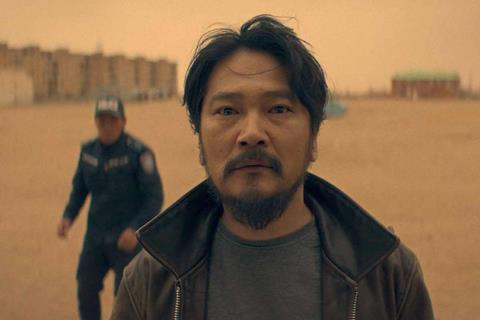A city cop finds himself cast adrift in this pointedly political Mongolian hostage thriller

Dir: Baatar Batsukh. Mongolia. 2024. 78mins
In a small Mongolian backwater, a big city police captain is drafted in to navigate a hostage situation at the local hospital, only to find himself blocked at every turn by uncooperative locals and indifference from his higher-ups. Baatar Batsukh’s second film moves away from the overt horror of his debut Aberrance to focus on the real-life nightmare of living in a place ruled by an uncaring, corrupt state. After a brisk first half, this social messaging begins to weigh the film down, although it’s buoyed somewhat by Batsukh’s keen eye for visuals and the dark comedy woven throughout.
Striking visuals
As with Aberrance, which played at SXSW and had a limited US release in 2022, Travesty’s punchy title hints at the film’s thematic backbone. Premiering at Busan, the film’s hostage narrative will be familiar to a wider audience and, while the sociopolitical issues are specifically Mongolian, the idea of a repressed individual taking matters into his own hands strikes a universal chord, and may help the film to travel. Closer to home, the presence in the cast of popular Mongolian pop star Daviadasha (real name Ganbold Ariunbold) should help its prospects.
One of Travesty’s key selling points is its striking visuals — Batsukh is also a cinematographer who lensed both this, Aberrance and other works including Erdenebileg Ganbold’s The Steed. The action here takes place in a nondescript Mongolian outback town (which, according to a rusting old sign, may be called Travesty) painted in muted yellows and dusty browns; a low-key palette against which gleaming black city police vans seem like alien invaders.
In a leather jacket and jeans, police captain Davaa (Ariunbyamba Sukhee) initially approaches the situation with something of a swagger. Told that a gunman has taken the town’s only doctor and 19 others hostage in the city hospital, Davaa is convinced that he can bring the situation quickly to an end. The big city cop in the provincial town is a well-used trope, and Sukhee plays it effectively, his gruff, world-weary demeanour and casual attitude suggesting that his superior authority can outwit these outback hicks.
When the gunman kill his first victim and says that he will assassinate one person per hour until his ransom demands are met, Davaa realises he may need some help. The two local cops are clearly out of their depth so he calls his bosses, only to discover that they are reluctant to get involved, their concern about money and reputation outranking the “redneck” human lives at stake. As time ticks on — literally, the police station clock being a constant, obvious presence on the soundtrack — Davaa must try and figure out exactly who he is up against, and why.
The answer to that comes in a muddy second half that swaps initial tension-building for a more overtly political approach, as Davaa comes to understand that the desperate motivations of the unnamed young gunman (Ganbold) align with his own personal feelings about his country. Shooting in widescreen with blurring at the edges, Batsukh effectively utilises reflections, extreme angles and reverse shots to also blur the psychological line between captain and criminal.
As the police station fills up with a Greek chorus of local criminals and, for some unidentified reason, a woman in labour, an element of farce begins to lap around the edges. Yet, elsewhere, the screenplay, by Erdene Orosoo, becomes increasingly pointed. “One man’s screams will not fix this social travesty,” laments Davaa. Chapter headings — ‘The Town’, ’The City’, ‘The Nation, ’The State’ — suggest that the rot has set in on a national scale, and the mournful undercurrent of Bayarkhuu Nyamkhuu’s sinister soundtrack takes hold as the film reaches its bloody conclusions. By this point, even before a coda involving a flashback and a message written in bullet dust, Travesty has begun to buckle under its own righteous fury.
Production companies: Update Entertainment, Team Hero, Nomadia Pictures, Three Flames Pictures
International sales: Three Flames Pictures, info@threeflamespictures
Producers: Aleza Khan, Trevor Morgan Doyle, Baatar Batsukh
Screenplay: Erdene Orosoo
Cinematography: Baatar Batsukh
Production design: Saruul Munkhbat
Editor: Baatar Batsukh
Music: Bayarkhuu Nyamkhuu
Main cast: Ariunbyamba Sukhee, Ariunbold Ganbold, Garid Buntar, Ganbaatar Chagnaador, Bazarragchaa Byambajav















![[L-R]: Amanda Villavieja, Laia Casanovas, Yasmina Praderas](https://d1nslcd7m2225b.cloudfront.net/Pictures/274x183/6/4/1/1471641_pxl_20251224_103354743_618426_crop.jpg)








